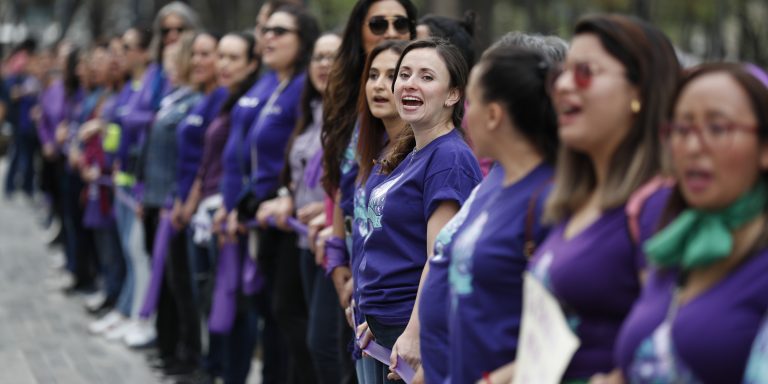INTELBRIEF
March 9, 2020
IntelBrief: Gender Equity in Political and National Security Leadership Still Lagging

- Sunday, March 8 marked International Women’s Day, an opportunity to take stock of efforts to achieve global gender equity across politics, education, health, national security, and the economy.
- Gender diversity in U.S. national security remains lackluster, especially in positions of leadership.
- Women are gaining traction in breaking political glass ceilings, but obstacles such as gender and media bias, and the ‘gender tax’ stand in the way.
- Politically motivated attacks on women have been on the rise in nearly every region of the world.
.
Sunday, March 8 marked International Women’s Day, an opportunity to take stock of efforts to achieve global gender equity across politics, education, health, national security, and the economy. In 2020, several mechanisms to achieve gender parity will reach milestones, including the five-year anniversary of the UN’s Sustainable Development Goal 5 calling for full gender equality; the 20th anniversary of UN Security Council Resolution 1325, which called for greater inclusion of women in peace and security (WPS); and the 25th anniversary of the Beijing Declaration. Despite these mechanisms, the glaring gender equity gap persists in 2020. According to the World Economic Forum’s 2020 Global Gender Gap Report, gender parity will not be reached for at least another 100 years. Female parity is not just for diversity’s sake. Research demonstrates that gender inclusion has been associated with more effective governance, decreased corruption, longer-lasting peace deals, and the increased effectiveness of teams. Women are also more likely to reach across political divides to achieve results.
Two areas where significant challenges remain to achieve gender parity are national security and political leadership. While the United States is a leader in national security - assessed by the historical strength and organization of the American military, intelligence community and diplomatic service - gender diversity within this sector remains lackluster. The absence of women is most obvious in leadership. The Department of Defense has yet to name a woman as its Secretary of Defense and women have never exceeded in more than 20 percent of its senior level positions. Only three women - Madeline Albright, Condoleezza Rice and Hillary Clinton - have ever served as U.S. Secretary of State, a mere 6 percent of all 47 secretaries who have served. Only two women have ever served as national security advisor. This is despite the fact that nearly 40 percent of the U.S. intelligence community andU.S. foreign service officers are women, and nearly half of graduate students who study international affairs are women. While there is a growing pool of female talent entering national security, they are not making it to leadership positions. Experts argue that women are not being promoted equitably and have to pay a ‘gender tax,’ which is considered to be the mental and emotional strain that comes from implicit or explicit sexism, discrimination, gender and sexual harassment, and/or gendered expectations. Organizations like the Leadership Committee for Women in National Security and Girl Security are seeking to increase the representation, reach, and profile of women in national security.
Despite a litany of obstacles, women have made recent gains in entering the political arena, particularly over the last three decades. Since 1995, the percentage of women entering legislatures around the world has more than doubled, but still remains low at 24.5 percent overall, according to the Council on Foreign Relations’ Women’s Power Index. The index ranks UN member states on their progress toward gender parity in political participation. As of 2018, women in the United States hold close to 25 percent of the seats in the House of Representatives and the Senate, the largest percentage in U.S. history, tracking closely to the global figure. And for first time in U.S. history, six women ran for the Democratic nomination for president of the United States, including two women of color. While the United States has yet to elect a woman president, at least 64 other nations have. In 2020, 19 countries have a female head of state or government. Some experts argue that bias has played a significant role in deterring women’s political leadership. Despite progress in closing the equality gap, close to nine out of 10 men and women around the world hold some sort of bias against women, according to new findings published this March by the UN Development Programme.
Worldwide, women have been under attack for exercising their political rights. According to the Armed Conflict Location and Event Data Project, politically motivated attacks on women have been on the rise in nearly every region and peaked in 2019. Women who exercise their right to vote fall victim to violence at nearly four times the rate of men. This partially explains the recent rise in female political activism, with women taking to the streets and leading protests across the globe, from Iraq to Hong Kong and Mexico to Sudan, calling for action against political corruption, inequality, and domestic violence. While international women’s day is a time of reflection, it should also be a time for action. Whether it be fighting terrorists, combatting foreign interference or helping to build democracies, women are inextricably linked to these national security priorities. While the Trump administration is overwhelmingly male and seems uninterested in changing its gender dynamic, women throughout the national security sector should continue fighting, through initiatives like #5050in2020 Pledge for Gender Parity, for full gender inclusion and parity at the highest levels of national security leadership.
.
For tailored research and analysis, please contact: info@thesoufancenter.org